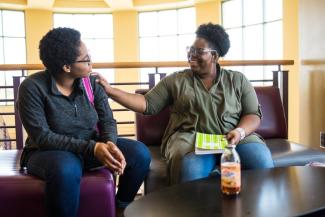How Accountability Friendships Work

“How is it with your soul?” When was the last time someone asked you that.
We live in a time of radical connection — many of us are available all the time via text or DM. But many of us also experience epic bouts of loneliness. We carry secrets that make us sick.
All around us, God works wonders. Even on your campus, there’s much to celebrate. But we get distracted or move on too quickly to really notice.
To experience a deeper level of community, to help make celebration a regular part of our spiritual lives, something needs to change in our journey with Jesus. And it’s a change that can begin right now, even as we navigate life on campus or in our careers. The change I’m talking about revolves around accountability friendships.
Healthy accountability friendships give us space for self-discovery and for deep and genuine friendships. This leads to less anxiety, higher performance at work and school, and spiritual transformation.
Followers of Jesus have leaned on these relationships since the start of the Christian movement, confessing their sins to each other and praying for each other as they faced trouble and sickness and persecution (Jas 5:13-16). To be honest with friends about your struggles and successes and to have them receive you with kindness and love — this is a beautiful echo of God’s own posture toward you.
What are accountability friendships?
They’re pretty simple: gather regularly with three to four trusted friends for a structured time of confidential and honest sharing that helps you grow in Christlikeness. That’s it.
While the idea of “accountability friendships” might call to mind a one-to-one interaction, I’ve found that slightly larger gatherings (say, three to five people) prove more beneficial. A slightly larger circle will find it more easily to follow a structure for conversation. Additionally, the larger group pushes you all to set a more regular time. And finally, if someone leaves the gathering (graduates, moves away, turns into a werewolf living beneath the Whomping Willow), the group can still continue.
I’ve had several accountability friendships over the years and have found them very helpful. Right now, I’m meeting with three guys who also work in the non-profit sector. We’ve walked through the pandemic together, helped each other navigate major career transitions, and given each other space to share our struggles and successes. And we’ve grown together in our love for Jesus.
- We meet every other week for breakfast, catching up and sharing stories. Then we go around the circle, each sharing for 10-15 minutes.
- We use a set of questions from the free Discipleship Bands app — the same questions every week so we know what to expect.
- We don’t offer advice, though we’ll give it if asked and may ask clarifying questions to facilitate sharing.
- We don’t go around the circle praying for each other, though we spend a lot of time praying for each other on our own.
- We have a “vault commitment.” Nothing shared in the group leaves the group … ever.
Why doesn’t everyone have accountability friendships?
For some, friendships like this sound spectacular. For others, a nightmare. I’ve found that people avoid these groups for three main reasons:
1. Shame. We fear being fully known. We run from accountability. We hide. If we confess our sins, we might be judged or cancelled. If we celebrate our successes, we might be considered arrogant. As students, faculty, and campus ministers, many of us carry anxiety in our backpacks every day — and accountability friendships feel vulnerable. We anticipate rejection and, as a result, hold back.
2. Distrust. Christian communities can be manipulative and toxic — even on campus. Many of us carry scars from the abuse heaped on us from religious communities. We’re like Christ in this way (see Jn 11:45-57). We hold people at a distance for our own safety.
3. Busyness. School, work, family. Classes, labs, work-study, grant-writing. Tick tock goes the clock. Hours fly by, and that’s not even counting time spent on TikTok, reels, or doom-scrolling. Relationships of trust require time.
There’s no silver bullet to move you past shame, distrust, and busyness. I’ve been walking with Jesus for 29 years, and I wrestle with all three of these on an almost daily basis. What I can say to you is that those barriers — though they make the art of spiritual friendship difficult — need not stop you. My friends over the years have shown me compassion even when I’ve been buried under the shame of failure, prickly with distrust, and too busy for the health of my soul. And I’ve done the same for them.
As a result of these accountability friendships, we’ve become better employees and spouses and parents and ministry leaders and friends. We’ve seen addictions broken, family relationships restored, courses of study change, stories of miraculous financial provision. But, mostly, through these friendships, we’ve given and received the love of God.
How do I start accountability friendships?
I’ve had the gift of being invited into an existing accountability group. The other people trusted each other, shared first, and set the tone. All I had to do was find the courage to accept the invitation.
I hope you get that experience.
But if you get dealt a different starting deck, you can initiate friendships of your own. Start by asking Jesus to give you wisdom about who to invite. Text three to four friends. (You can see a sample script below.) Set some “house rules.” I highly recommend the rules I mentioned earlier around advice and the vault. Commit to meeting for three months, then decide if you’ll continue after that.
You don’t have to settle for isolation or shallow community. You don’t have to celebrate alone. You don’t have to carry all your secrets all by yourself.
You can step away from shame. You can push through distrust. You can leave your busyness behind.
On the other side of all those obstacles, there’s acceptance and trust and peace. God gives us the gift of spiritual friendship and — through that gift — changes our campuses and the world.
—--------------
A Text Script to Initiate Accountability Friendships
Hi Taylor!* I’m pulling a group of 3-4 people** together to meet every other week*** to share about our struggles and successes, confess our sins, and pay greater attention to God. We’ll be meeting on Tuesday at McDonald’s at 7 p.m. to talk about the idea. Would you want to join?
*The common practice is to invite people similar to you in age, gender, and faith commitment.
**Feel free to adjust the group size. I recommend three to five.
***Feel free to adjust the meeting frequency. I’d say probably no less than every other week.







